1. Match the printing term to the correct definition.
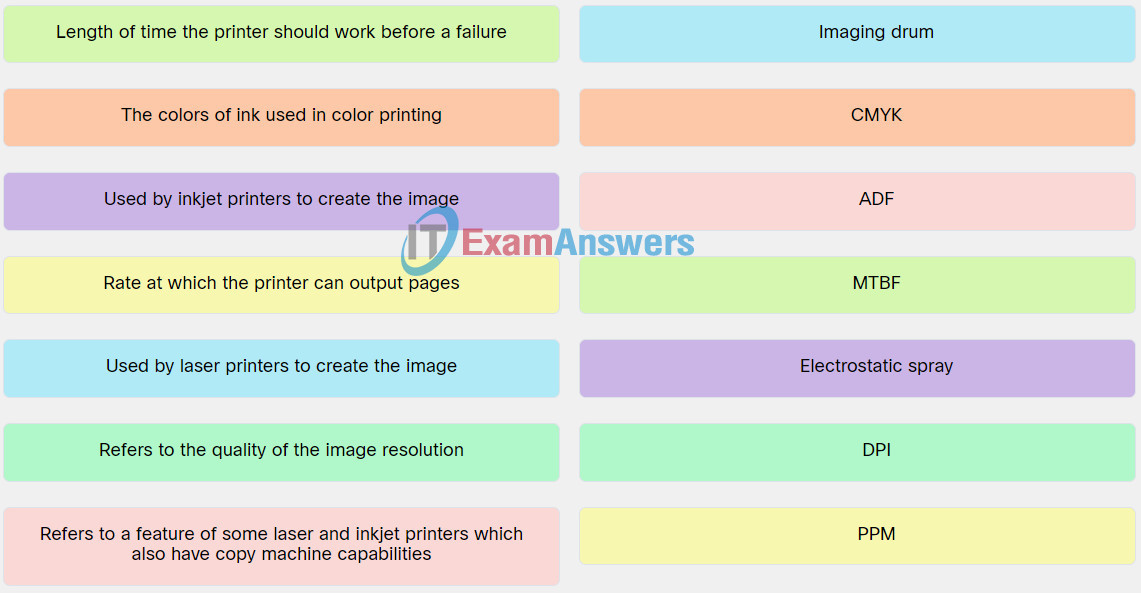
Explanation: Place the options in the following order:
| Refers to a feature of some laser and inkjet printers which also have copy machine capabilities. |
ADF |
| Used by laser printers to create the image. |
Imaging drum |
| Length of time the printer should work before a failure. |
MTBF |
| Used by inkjet printers to create the image. |
Electrostatic spray |
| The colors of ink used in color printing. |
CMYK |
| Rate at which the printer can output pages. |
PPM |
| Refers to the quality of the image resolution. |
dpi |
2. Match the printer port with the respective description.
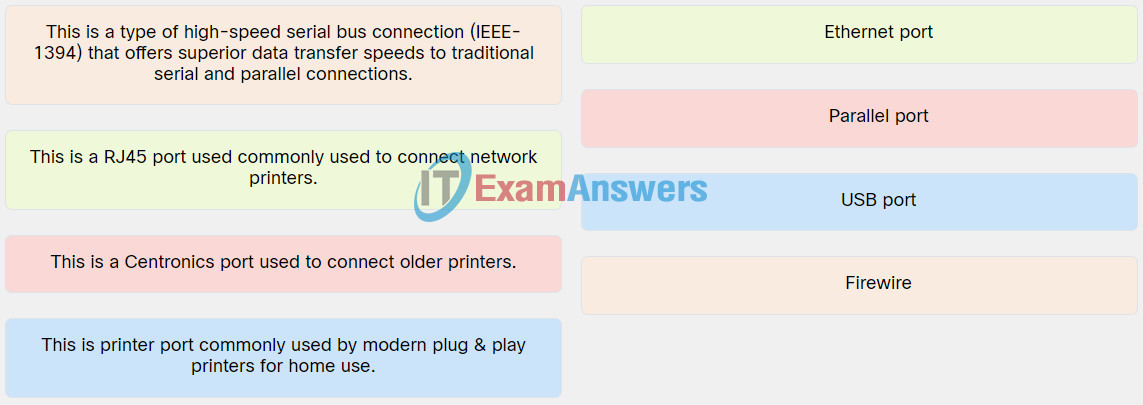
Explanation: Place the options in the following order:
| This is printer port commonly used by modern plug & play printers for home use. |
USB port |
| This is a RJ45 port used commonly used to connect network printers. |
Ethernet port |
| This is a type of high-speed serial bus connection (IEEE-1394) that offers superior data transfer speeds to traditional serial and parallel connections. |
Firewire |
| This is a Centronics port used to connect older printers. |
Parallel port |
3. Match the inkjet printer part to the correct purpose.
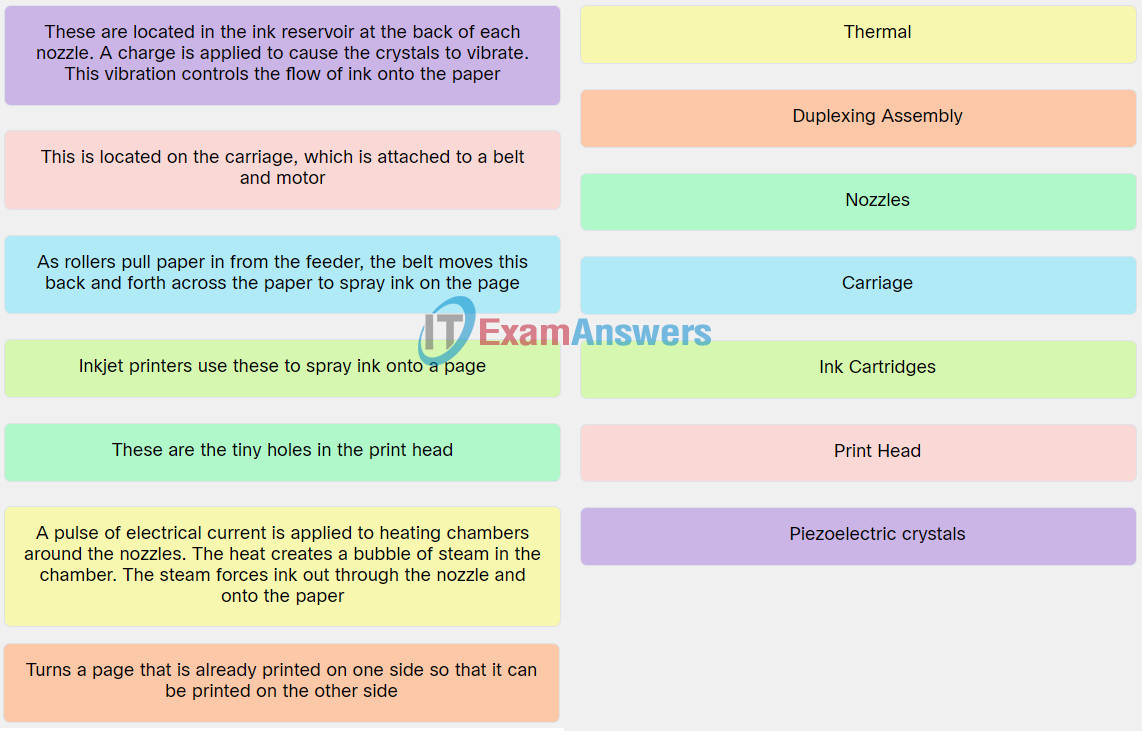
Explanation: Place the options in the following order:
| This is located on the carriage, which is attached to a belt and motor. |
Print Head |
| As rollers pull paper in from the feeder, the belt moves this back and forth across the paper to spray ink on the page. |
Carriage |
| Inkjet printers use these to spray ink onto a page. |
Ink Cartridges |
| These are located in the ink reservoir at the back of each nozzle. A charge is applied to cause the crystals to vibrate. This vibration controls the flow of ink onto the paper. |
Piezoelectric crystals |
| These are the tiny holes in the print head. |
Nozzles |
| Turns a page that is already printed on one side so that it can be printed on the other side. Duplexing Assembly A pulse of electrical current is applied to heating chambers around the nozzles. The heat creates a bubble of steam in the chamber. The steam forces ink out through the nozzle and onto the paper. |
Thermal |
4. Match the laser printer part to the correct purpose.
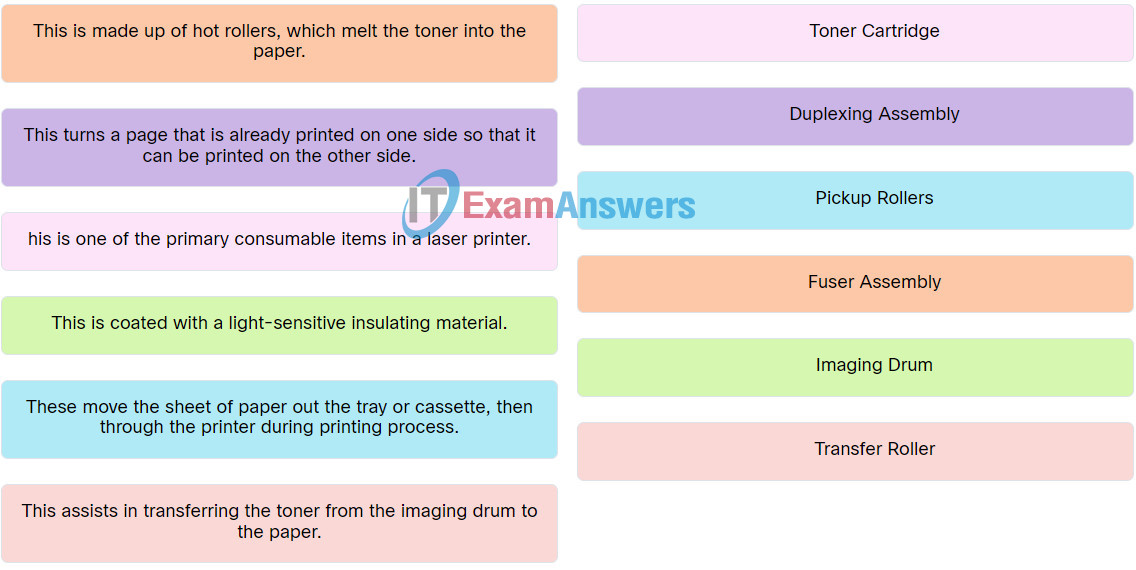
Explanation: Place the options in the following order:
| This assists in transferring the toner from the imaging drum to the paper. |
Transfer Roller |
| These move the sheet of paper out the tray or cassette, then through the printer during printing process. |
Pickup Rollers |
| This is coated with a light-sensitive insulating material. |
Imaging Drum |
| This turns a page that is already printed on one side so that it can be printed on the other side. |
Duplexing Assembly |
| This is one of the primary consumable items in a laser printer. |
Toner Cartridge |
| This is made up of hot rollers, which melt the toner into the paper. |
Fuser Assembly |
5. Match the laser printing process to the correct explanation.
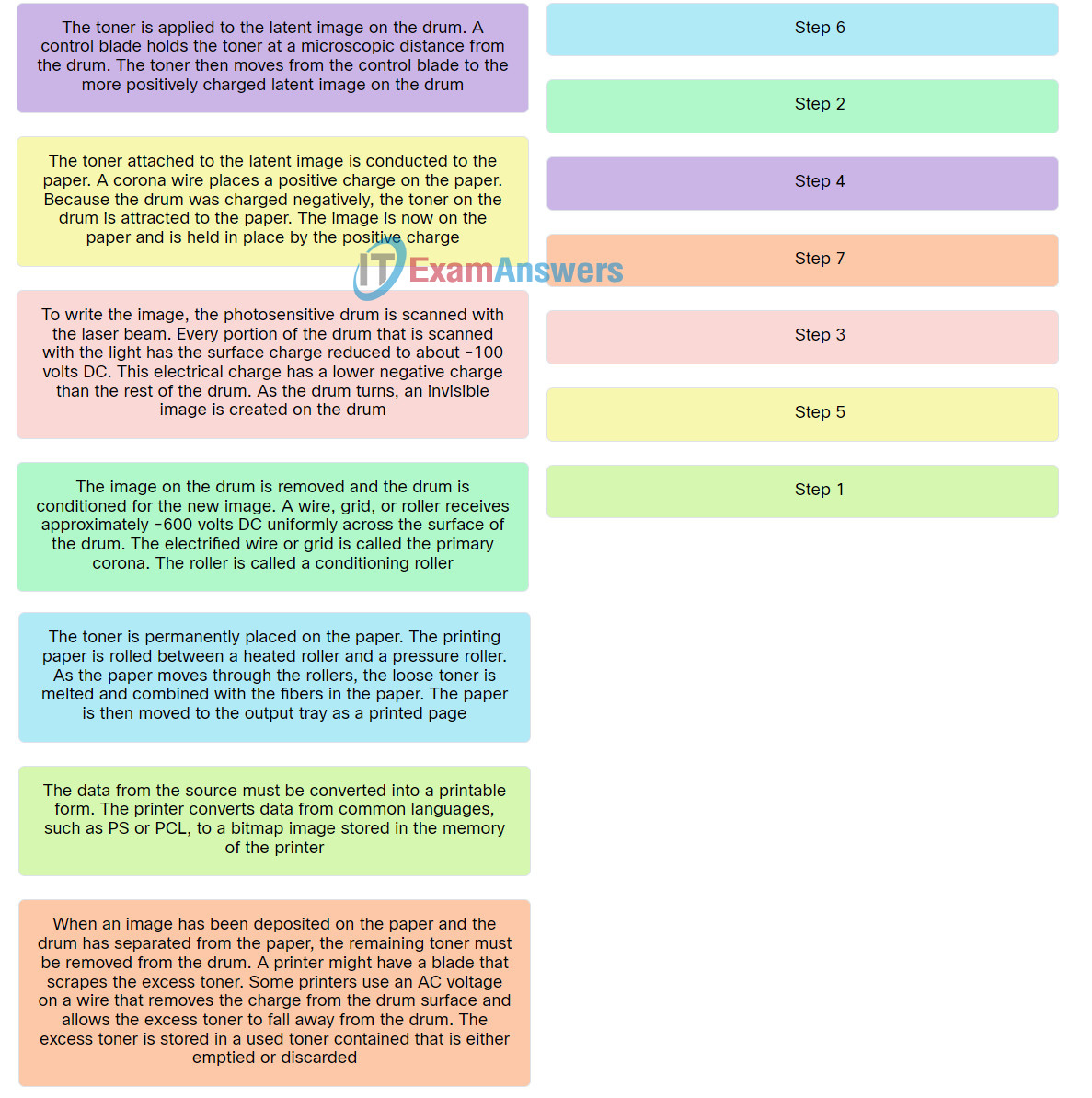
Explanation: Place the options in the following order:
| To write the image, the photosensitive drum is scanned with the laser beam. Every portion of the drum that is scanned with the light has the surface charge reduced to about -100 volts DC. This electrical charge has a lower negative charge than the rest of the drum. As the drum turns, an invisible image is created on the drum. |
Step 3 |
| The toner is permanently placed on the paper. The printing paper is rolled between a heated roller and a pressure roller. As the paper moves through the rollers, the loose toner is melted and combined with the fibers in the paper. The paper is then moved to the output tray as a printed page. |
Step 6 |
| The data from the source must be converted into a printable form. The printer converts data from common languages, such as PS or PCL, to a bitmap image stored in the memory of the printer. |
Step 1 |
| The toner is applied to the latent image on the drum. A control blade holds the toner at a microscopic distance from the drum. The toner then moves from the control blade to the more positively charged latent image on the drum. |
Step 4 |
| When an image has been deposited on the paper and the drum has separated from the paper, the remaining toner must be removed from the drum. A printer might have a blade that scrapes the excess toner. Some printers use an AC voltage on a wire that removes the charge from the drum surface and allows the excess toner to fall away from the drum. The excess toner is stored in a used toner contained that is either emptied or discarded. |
Step 7 |
| The toner attached to the latent image is conducted to the paper. A corona wire places a positive charge on the paper. Because the drum was charged negatively, the toner on the drum is attracted to the paper. The image is now on the paper and is held in place by the positive charge. |
Step 5 |
| The image on the drum is removed and the drum is conditioned for the new image. A wire, grid, or roller receives approximately -600 volts DC uniformly across the surface of the drum. The electrified wire or grid is called the primary corona. The roller is called a conditioning roller. |
Step 2 |
6. Match the characteristic to the appropriate type of printer.
- The ribbon strikes the paper, imprinting the character on the paper – Impact Printer
- These printers use continuous feed paper and can print carbon copies – Impact Printer
- Perforated strips on the side are used to feed the paper and to prevent skewing or shifting – Impact Printer
- The heated areas of the print head make the image on the paper – Thermal Printer
- There is no cost for ink or toner – Thermal Printer
7. Match the virtual printing term to the appropriate characteristic.
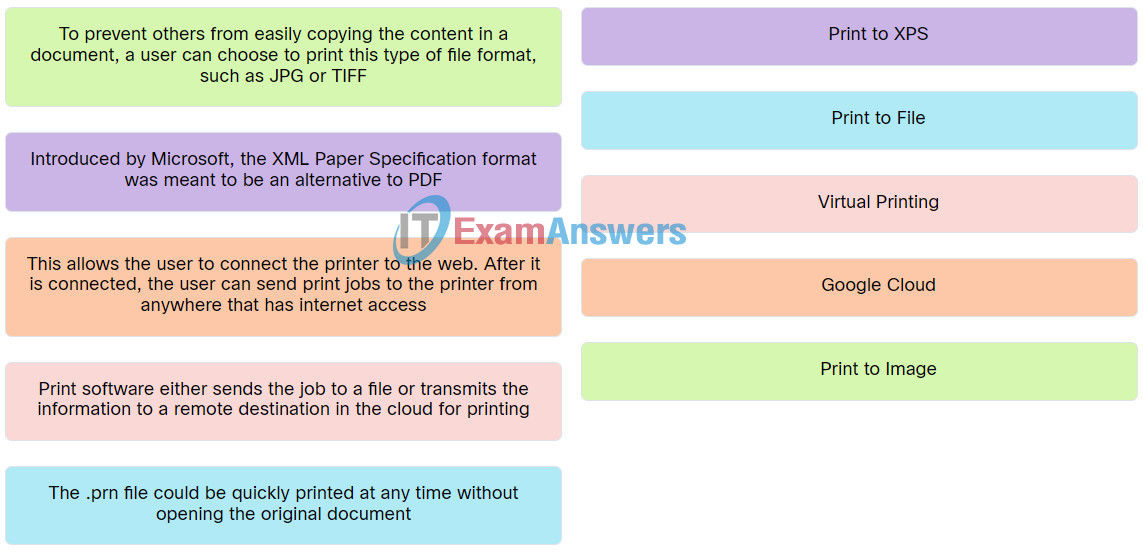
Explanation: Place the options in the following order:
| Print software either sends the job to a file or transmits the information to a remote destination in the cloud for printing. |
Virtual Printing |
| The .prn file could be quickly printed at any time without opening the original document. |
Print to File |
| To prevent others from easily copying the content in a document, a user can choose to print this type of file format, such as JPG or TIFF. |
Print to Image |
| Introduced by Microsoft, the XML Paper Specification format was meant to be an alternative to PDF. |
Print to XPS |
| This allows the user to connect the printer to the web. After it is connected, the user can send print jobs to the printer from anywhere that has internet access. |
Google Cloud |
8. Match a 3D printer part to the correct purpose.
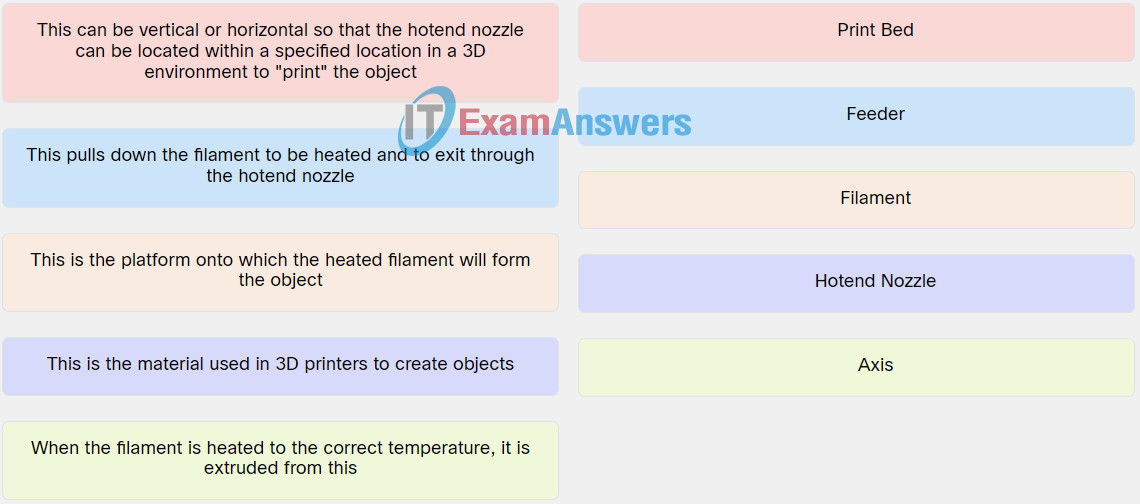
Explanation: Place the options in the following order:
| This pulls down the filament to be heated and to exit through the hotend nozzle. |
Feeder |
| When the filament is heated to the correct temperature, it is extruded from this. |
Hotend Nozzle |
| This is the platform onto which the heated filament will form the object. |
Print Bed |
| This can be vertical or horizontal so that the hotend nozzle can be located within a specified location in a 3D environment to “print” the object. |
Axis |
| This is the material used in 3D printers to create objects. |
Filament |
9. Match the common printer settings to the appropriate type.
- Grayscale Printing – Configuration
- Duplex – Configuration
- Print Quality – Configuration
- Output Path Selection – Media Control
- Paper Weight – Media Control
- Print Speed – Media Control
10. Match the setting type to the correct characteristic.

Explanation: Place the options in the following order:
| Adjust settings to match the colors on the screen to the colors on the printed sheet. |
Color Calibration |
| Select landscape or portrait image layout. |
Paper Orientation |
| Cancel or pause current print jobs in the printer queue. |
Print Spool Settings |
11. Match the printer server feature to the correct type of printer server.
- The server accepts incoming print jobs from computers, thereby freeing the computers for other tasks. However, it can only manage one printer. – Dedicated
- Used in large networking environments to manage multiple printers at a time. – Dedicated
- He computer sharing the printer uses its own resources to manage the print jobs coming to the printer. – Dedicated
- It must have a powerful processor, adequate storage space, and memory to meet the requests of print clients. – Dedicated
12. Read each statement. Depending on what you think of the statement, select True or False.
- Printers are affected by temperature, humidity, and electrical interference. – True
- Paper is not affected by its environment. – False
- Toner cartridges should be kept in their original wrappers. – True
- Toner is not affected by humidity. – False
- Dust is an environmental problem for all printers. – True
13. Match the item to the appropriate thermal printer preventive maintenance description.

Explanation: Place the options in the following order:
| Thermal printers use this to create an image on special paper. |
Heat |
| Use this to clean the heating element of a thermal printer. |
Isopropyl alcohol |
| Use this to remove debris from the inside of the thermal printer. |
Compressed air |
14. Match the item to the appropriate impact printer preventive maintenance description

Explanation: Place the options in the following order:
| If a consistent flaw is produced in all characters, this is stuck or broken and needs to be cleaned or even replaced. |
Print head |
| An impact printer is similar to this because the print head strikes an inked ribbon to transfer ink to the paper. |
Typewriter |
| When the impact printer produces faded or light characters, this is worn out and needs to be replaced. |
Ribbon |










